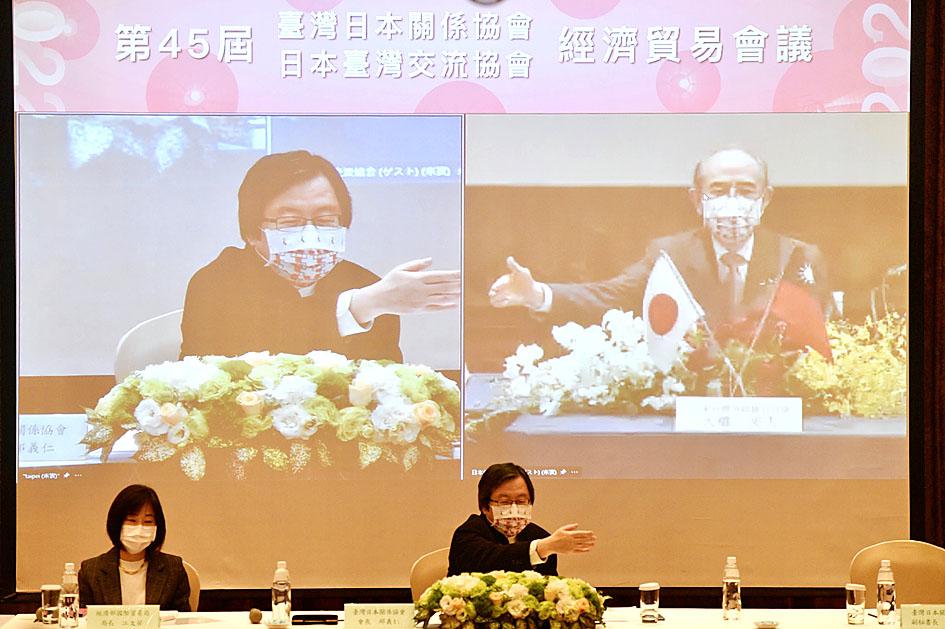The suggestion by Japan’s most senior diplomat in Taiwan to hold a meeting of the Taiwan-Japan Economic Partnership Committee gives a boost to the nation’s application to join the Comprehensive and Progressive Agreement for Trans-Pacific Partnership (CPTPP), Taiwan-Japan Relations Association Chairman Chiou I-jen (邱義仁) said yesterday.
Chiou made the remark at the 45th session of the Taiwan-Japan Economic and Trade Conference in response to Japan-Taiwan Exchange Association Chairman Mitsuo Ohashi telling the event that Taiwan’s efforts to ease trade regulations with Japan warranted a new meeting of the committee.
The government earlier this month announced that it would lift a ban on the importation of food products from Japan’s Fukushima Prefecture and four other prefectures that had been banned following the 2011 accident at the Fukushima Dai-ichi nuclear power plant.

Photo: George Tsorng, Taipei Times
The ban is to end on Feb. 28.
Ohashi said that lifting the ban would go a long way toward facilitating business ties between the two countries, including a tentative industrial cooperation project in semiconductor production.
Chiou said that a committee meeting should be scheduled as soon as possible.
The two countries need to discuss issues concerning trade, the economy, investment and Taiwan’s application to join the trade bloc, he said.
After the event, Chiou told reporters that the ban had been a major stumbling block for Taiwan’s CPTPP application, which relies on support from Japan, the bloc’s largest economy.
Taiwanese membership would not be possible as long as the ban remains in place, he said.
Chiou said that committee meetings — in which the two countries had deliberated a bilateral free-trade agreement and Taiwan’s path to membership in the then-proposed Trans-Pacific Partnership, the CPTPP’s predecessor — were suspended in 2014, as Taiwan three years earlier imposed the ban and, unlike other nations, did not lift it at that time.
Chiou said that he pledged that Taiwan would reconvene the committee right after Ohashi’s remarks, as the gesture required an immediate response.
Opening Taiwan to foreign agricultural products is a precondition for joining international trade organizations, he said, adding that lifting import bans has already led to short-term gains.
The lifting of a ban on the importation of pork products containing the feed additive ractopamine directly contributed to the resumption of talks with the US over the Trade and Investment Framework Agreement, he added.

CHAOS: Iranians took to the streets playing celebratory music after reports of Khamenei’s death on Saturday, while mourners also gathered in Tehran yesterday Iranian Supreme Leader Ayatollah Ali Khamenei was killed in a major attack on Iran launched by Israel and the US, throwing the future of the Islamic republic into doubt and raising the risk of regional instability. Iranian state television and the state-run IRNA news agency announced the 86-year-old’s death early yesterday. US President Donald Trump said it gave Iranians their “greatest chance” to “take back” their country. The announcements came after a joint US and Israeli aerial bombardment that targeted Iranian military and governmental sites. Trump said the “heavy and pinpoint bombing” would continue through the week or as long

TRUST: The KMT said it respected the US’ timing and considerations, and hoped it would continue to honor its commitments to helping Taiwan bolster its defenses and deterrence US President Donald Trump is delaying a multibillion-dollar arms sale to Taiwan to ensure his visit to Beijing is successful, a New York Times report said. The weapons sales package has stalled in the US Department of State, the report said, citing US officials it did not identify. The White House has told agencies not to push forward ahead of Trump’s meeting with Chinese President Xi Jinping (習近平), it said. The two last month held a phone call to discuss trade and geopolitical flashpoints ahead of the summit. Xi raised the Taiwan issue and urged the US to handle arms sales to

BIG SPENDERS: Foreign investors bought the most Taiwan equities since 2005, signaling confidence that an AI boom would continue to benefit chipmakers Taiwan Semiconductor Manufacturing Co’s (TSMC, 台積電) market capitalization swelled to US$2 trillion for the first time following a 4.25 percent rally in its American depositary receipts (ADR) overnight, putting the world’s biggest contract chipmaker sixth on the list of the world’s biggest companies by market capitalization, just behind Amazon.com Inc. The site CompaniesMarketcap.com ranked TSMC ahead of Saudi Aramco and Meta Platforms Inc. The Taiwanese company’s ADRs on Tuesday surged to US$385.75 on the New York Stock Exchange, as strong demand for artificial intelligence (AI) applications led to chip supply constraints and boost revenue growth to record-breaking levels. Each TSMC ADR represents

State-run CPC Corp, Taiwan (CPC, 台灣中油) yesterday said that it had confirmed on Saturday night with its liquefied natural gas (LNG) and crude oil suppliers that shipments are proceeding as scheduled and that domestic supplies remain unaffected. The CPC yesterday announced the gasoline and diesel prices will rise by NT$0.2 and NT$0.4 per liter, respectively, starting Monday, citing Middle East tensions and blizzards in the eastern United States. CPC also iterated it has been reducing the proportion of crude oil imports from the Middle East and diversifying its supply sources in the past few years in response to geopolitical risks, expanding